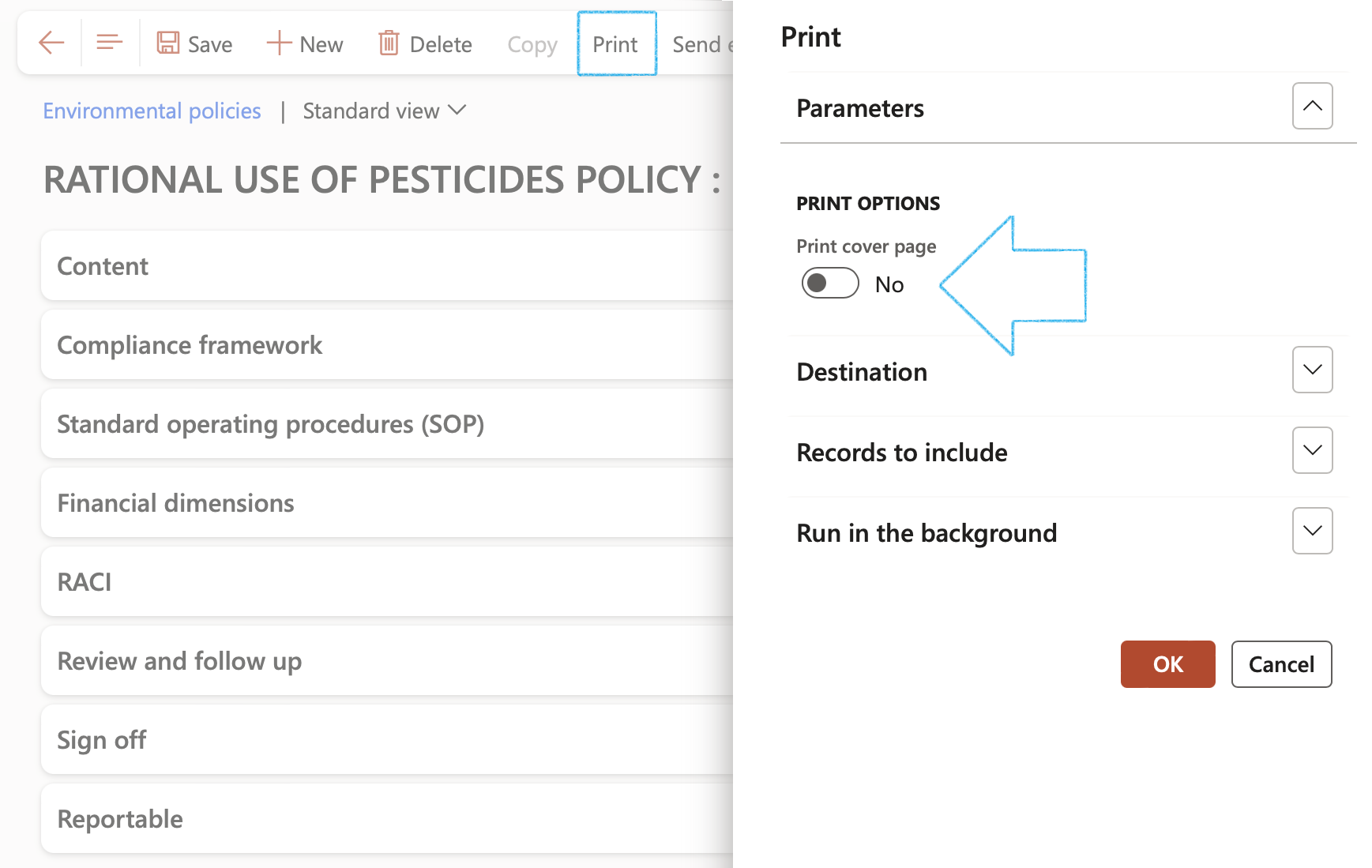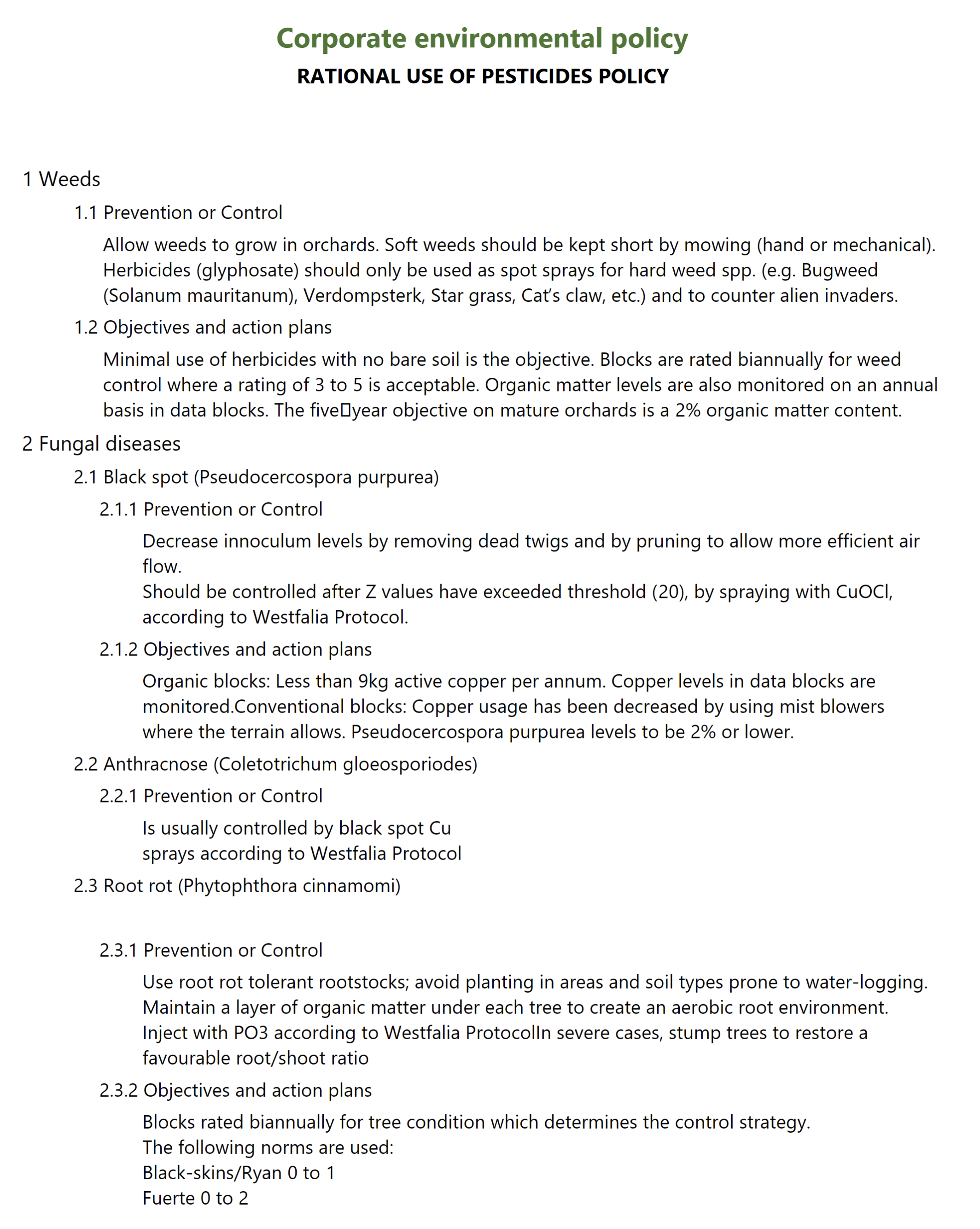
¶ Introduction
One way is to describe environmental policy is that it comprises two major terms: environment and policy. Environment refers to the physical ecosystems but can also take into consideration the social dimension (quality of life, health) and an economic dimension (resource management, biodiversity). Policy can be defined as a "course of action or principle adopted or proposed by a government, party, business or individual". Thus, environmental policy tends to focus on problems arising from human impact on the environment, which is important to human society by having a (negative) impact on human values. Such human values are often labelled as good health or the 'clean and green' environment. In practice, policy analysts provide a wide variety of types of information to the public decision-making process.
Environmental issues typically addressed by environmental policy include (but are not limited to) air and water pollution, waste management, ecosystem management, biodiversity protection, the protection of natural resources, wildlife and endangered species, and the management of these natural resources for future generations. Relatively recently, environmental policy has also attended to the communication of environmental issues. In contrast to environmental policy, ecological policy addresses issues that focus on achieving benefits (both monetary and non-monetary) from the non-human ecological world. Broadly included in ecological policy is natural resource management (fisheries, forestry, wildlife, range, biodiversity, and at-risk species). This specialized area of policy possesses its own distinctive features.
¶ Navigation
Inside Microsoft Dynamics 365, Axnosis created an area for Environmental policies. From the main menu, browse to HSE (Health, Safety and Environment)

¶ Specific setups
¶ Step 1: Create Document pack
A Document pack is used to group multiple documents together.
Go to: HSE > Safety and security > Setup for safety and security > Document pack
- On the Action pane, click on the New button
- In the Document pack ID field, enter a unique Document pack ID
- Enter a brief Description
- A SharePoint URL can be entered
- Expand the Recipients Fast tab and click on the Add button
- Select the Workers that you want to send the Document pack to
- Expand the Related documents Fast tab to view the documents related to the selected Document pack
Documents (policies) are related to a Document pack by selecting the Document pack on the Policy under the Content Fast tab in the Document pack field

¶ Step 2: Create the Environmental policy
Go to: HSE > Environmental > Environmental policies
- On the Action pane, click on the New button and select Document
- Complete the New environmental policy dialog
- Click OK
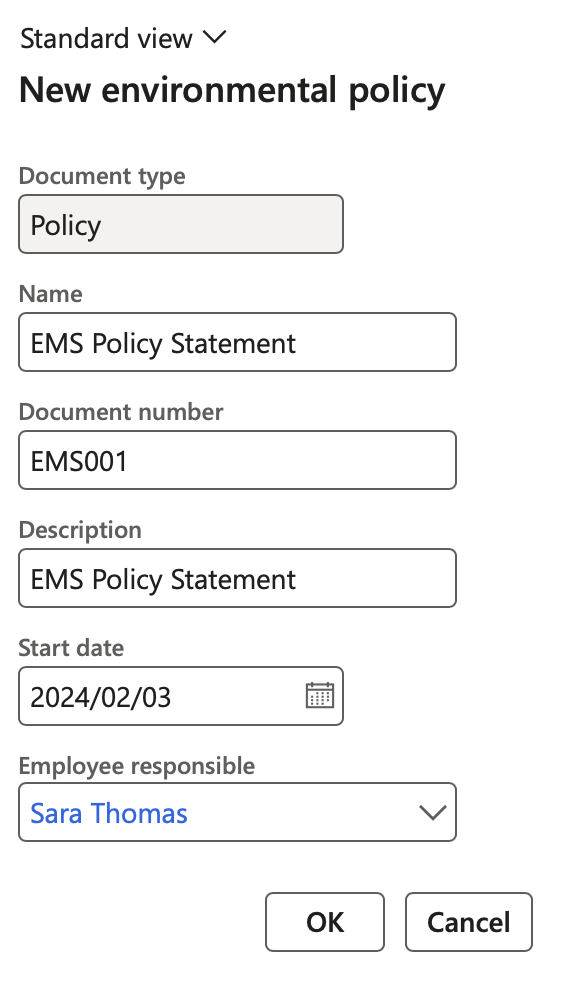
¶ Step 2.1: The Content Fast tab
- Expand the Content Fast tab
- Under the Cover page Index tab:
- The Document type field will be populated with Policy
- Enter information such as a SharePoint URL, Department, Date of expiration, etc.
- Select the relevant Document pack from the dropdown list (if required)
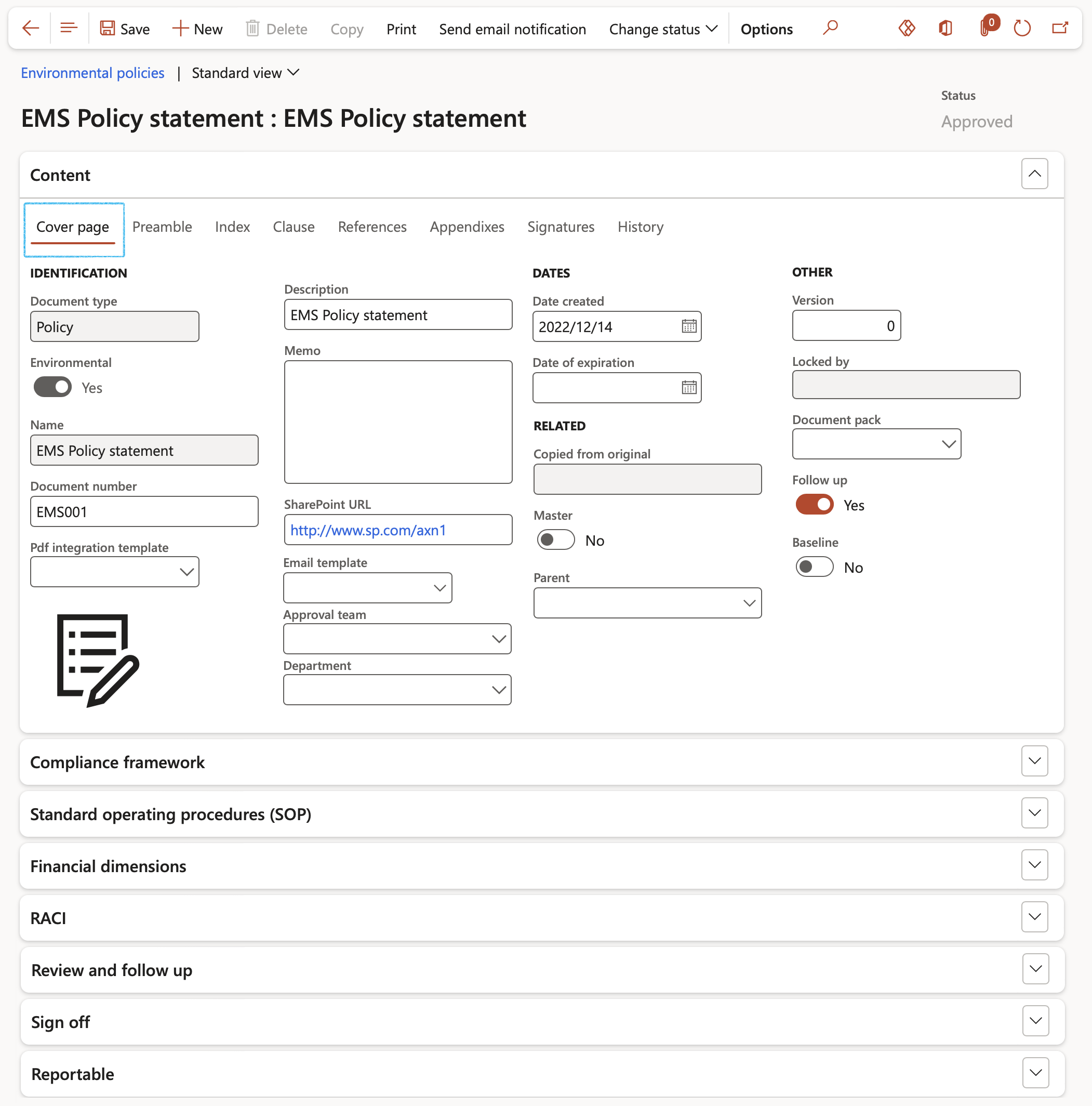
- Under the Preamble Index tab:
- Enter the introduction in the Notes box provided
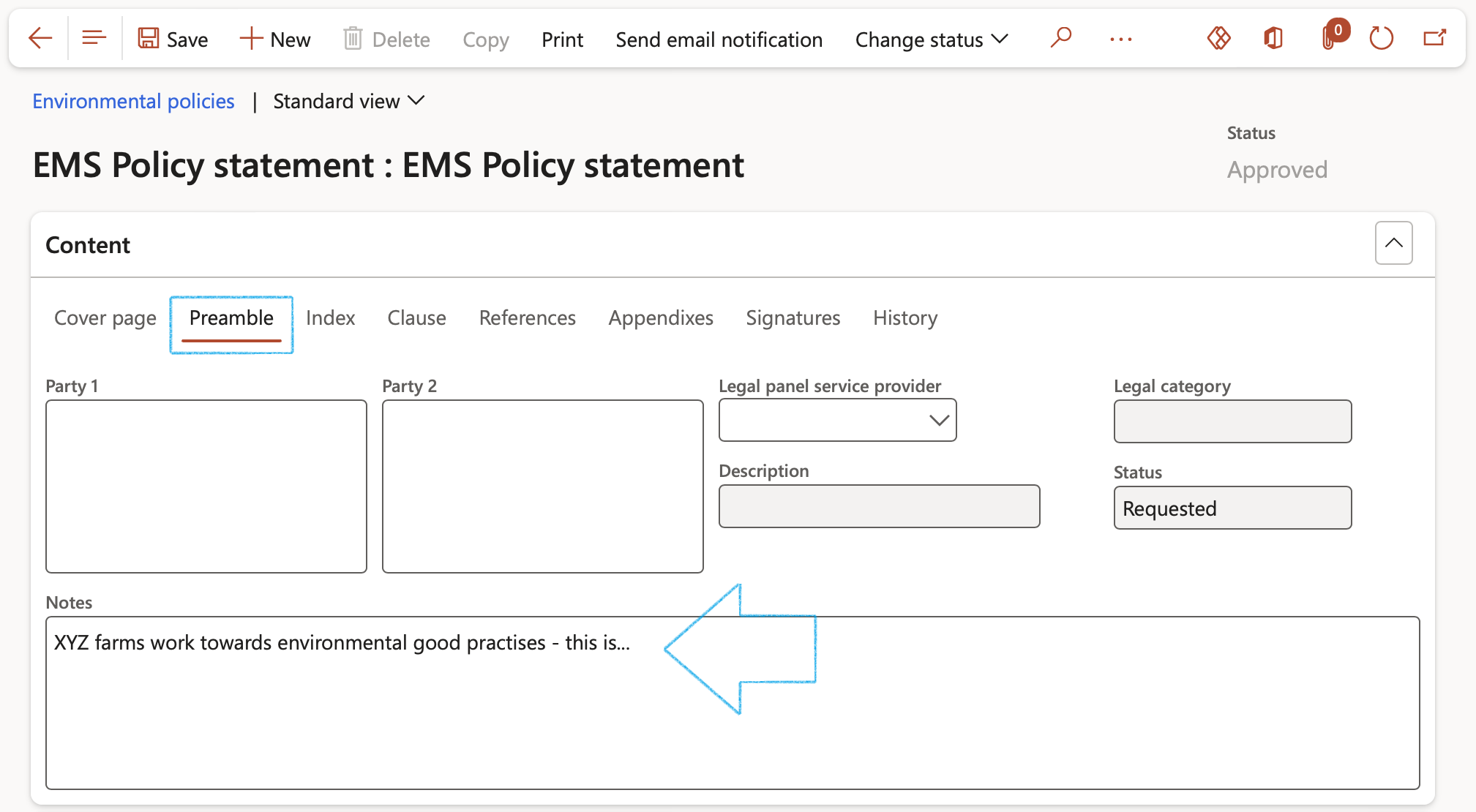
- Under the Clause Index tab:
- In the Button strip, click on the Add button
- The Clause number will be generated by the system
- Select the Heading (Heading 1 for a primary heading, Heading 2 for a secondary heading)
- Enter a Description
- Use the box provided to type the Clause definition

- Under the Signatures Index tab:
- Enter a Signature description
- Enter the Internal signature details
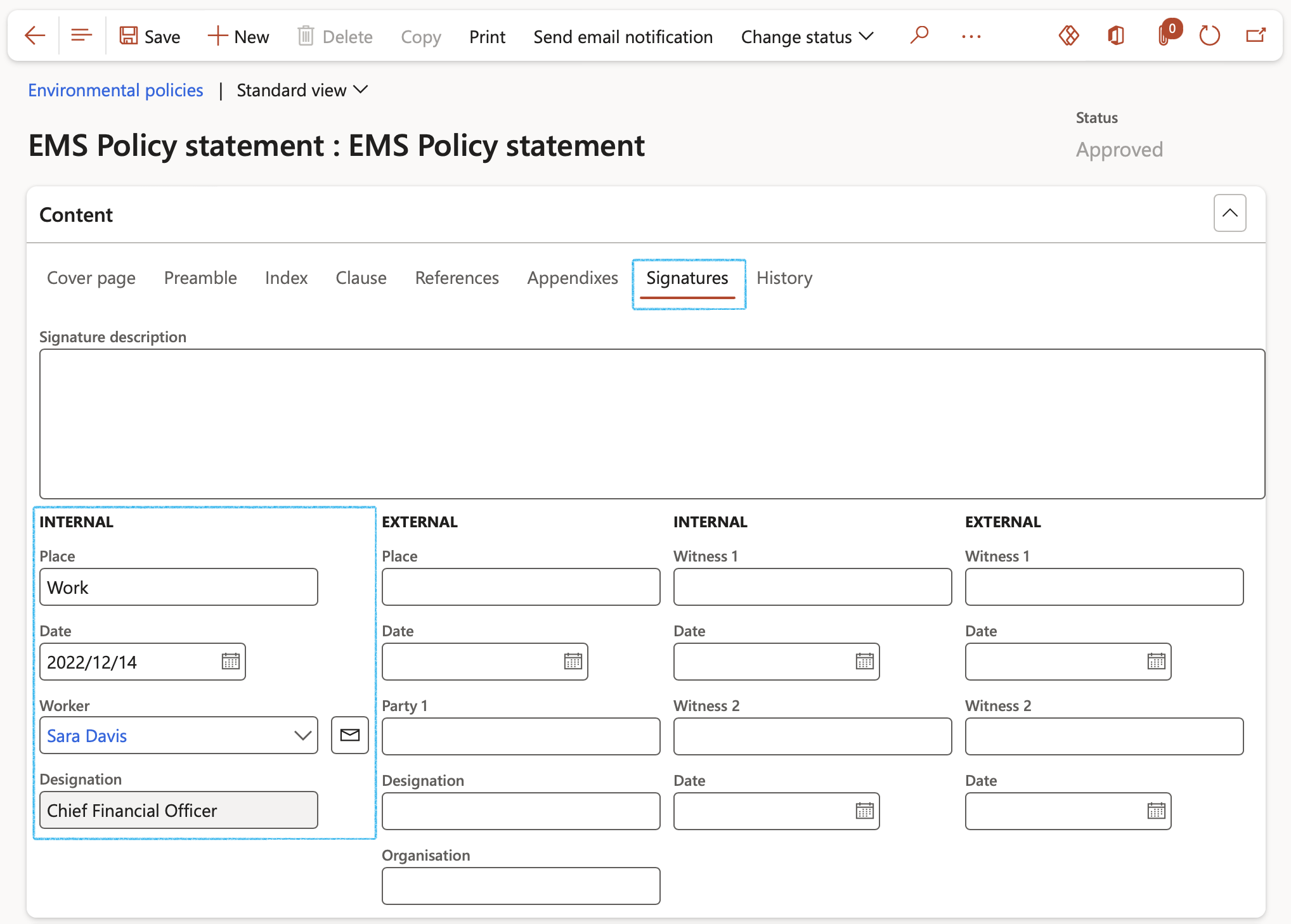
¶ Step 2.2: The Compliance framework Fast tab
- Expand the Compliance framework Fast tab
- Select the relevant Area of compliance from the drop-down list
- Select the relevant Compliance function from the drop-down list
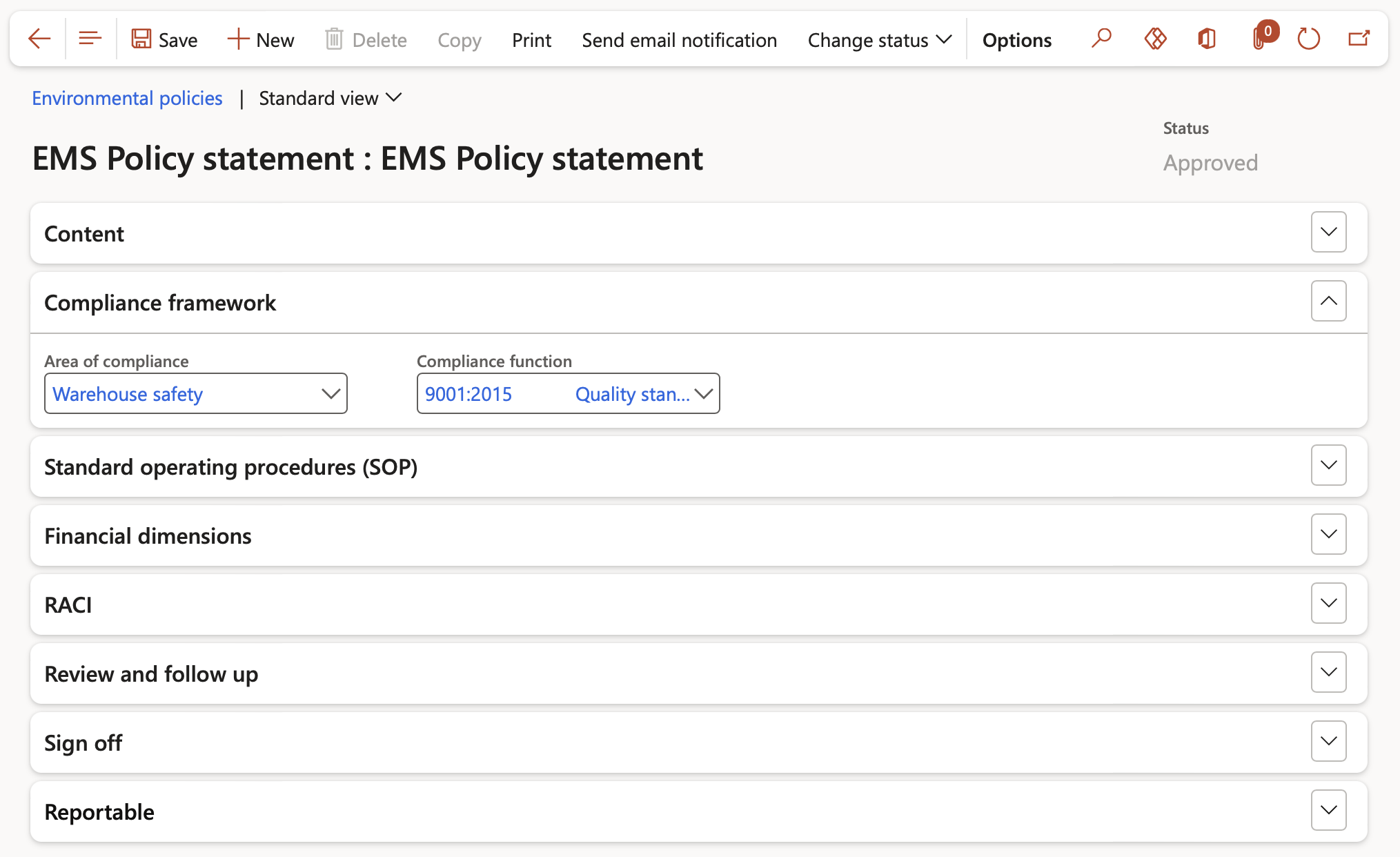
¶ Step 2.3: The RACI Fast tab
- Expand the RACI Fast tab
- Select the Employee responsible
- Select the Employee accountable
- Select the Employee consulted
- Select the Employee informed
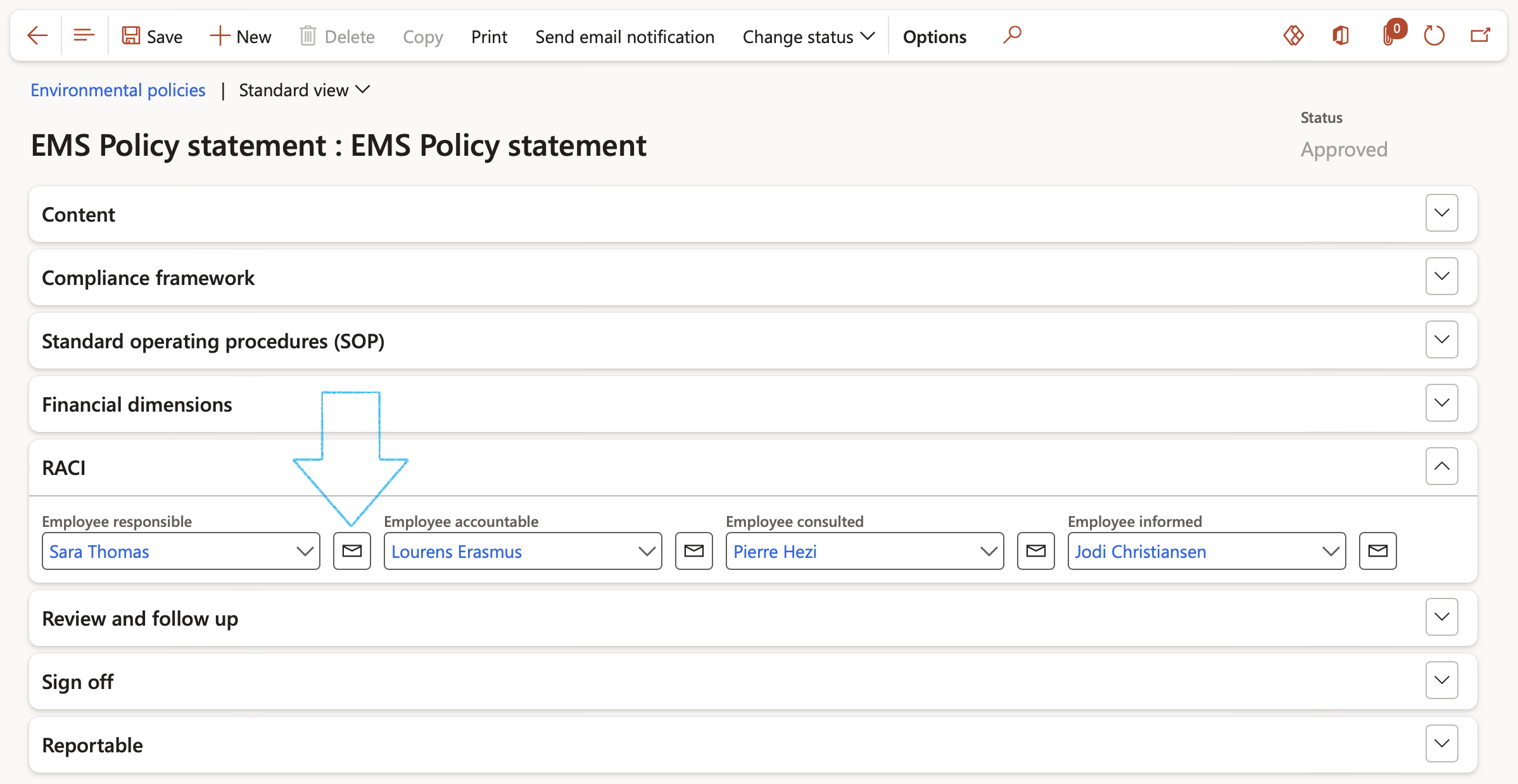
- Emails can be sent to the selected workers by clicking on the email icon next to the relevant name
- The selected worker must have a primary email address
¶ Step 2.4: The Review and follow up Fast tab
- Under the Content Fast tab, move the Follow up slider to Yes
- Expand the Review and follow up Fast tab
- Enter the Follow up notes in the box provided
- Select the worker’s name who did the review, from the drop-down list
- The Last review date field will be populated with today’s date (Can be edited)
- The Next review date field will be populated with the date calculated by the system (Calculated by using Last review date and Review frequency)
- Under the Content Fast tab, move the Follow up slider to No
- The notes entered in the Follow up note box will be moved to the Last review notes box, and the Last review date field will be populated
- Another follow up can be done now
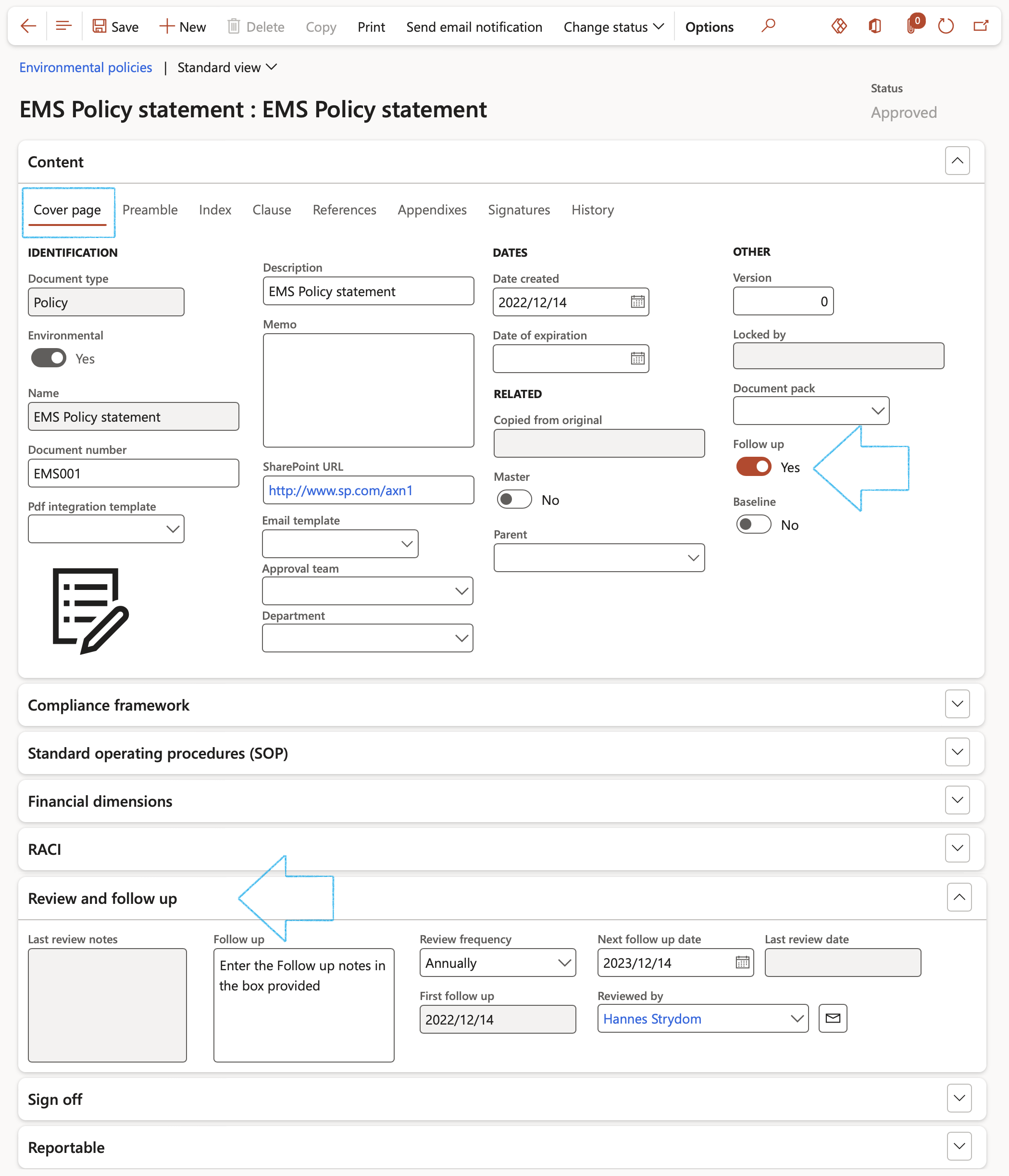
¶ Step 2.5: The Sign off Fast tab
- Expand the Sign off Fast tab
- In the button strip, click on the Add button
- Select either a Worker or Supplier, or enter a Contractor employee
- Enter the Date signed
- Select the relevant Signature type from the dropdown list
- Indicate which actions have been done by the Worker/Contractor employee
- Notified
- Legal counselled
- Risk assessed
- Approved
- Activities completed
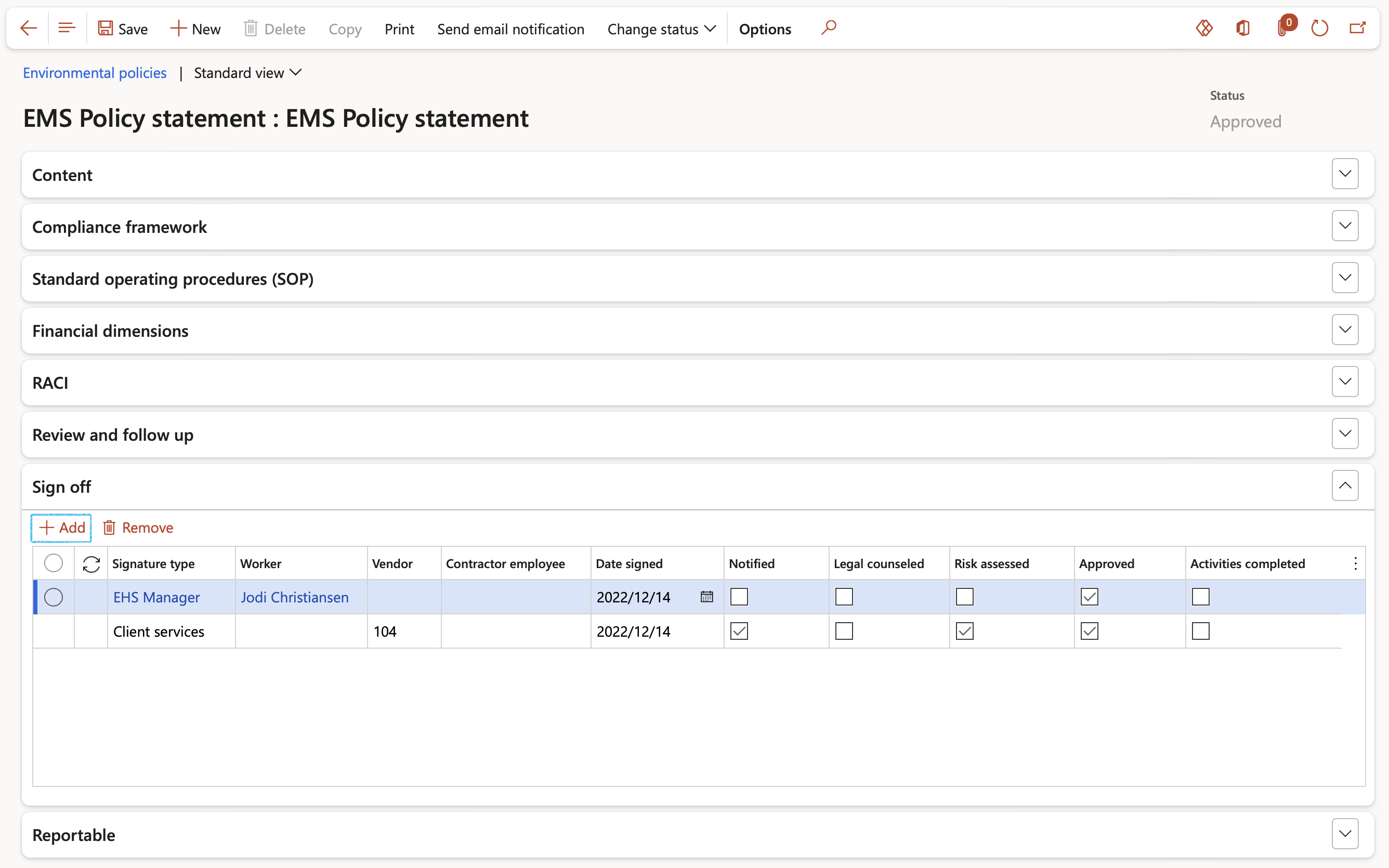
¶ Step 2.6: The Reportable Fast tab
- Expand the Reportable Fast tab
- Above the left hand side grid, in the Button strip, click on the Add button
- Select the relevant Reporting agency from the drop-down list
- If more that one is added, indicate which Reporting agency is the Primary one
- Above the right hand side grid, in the Button strip, click on the Add button
- Select the relevant Reporting category from the drop-down list
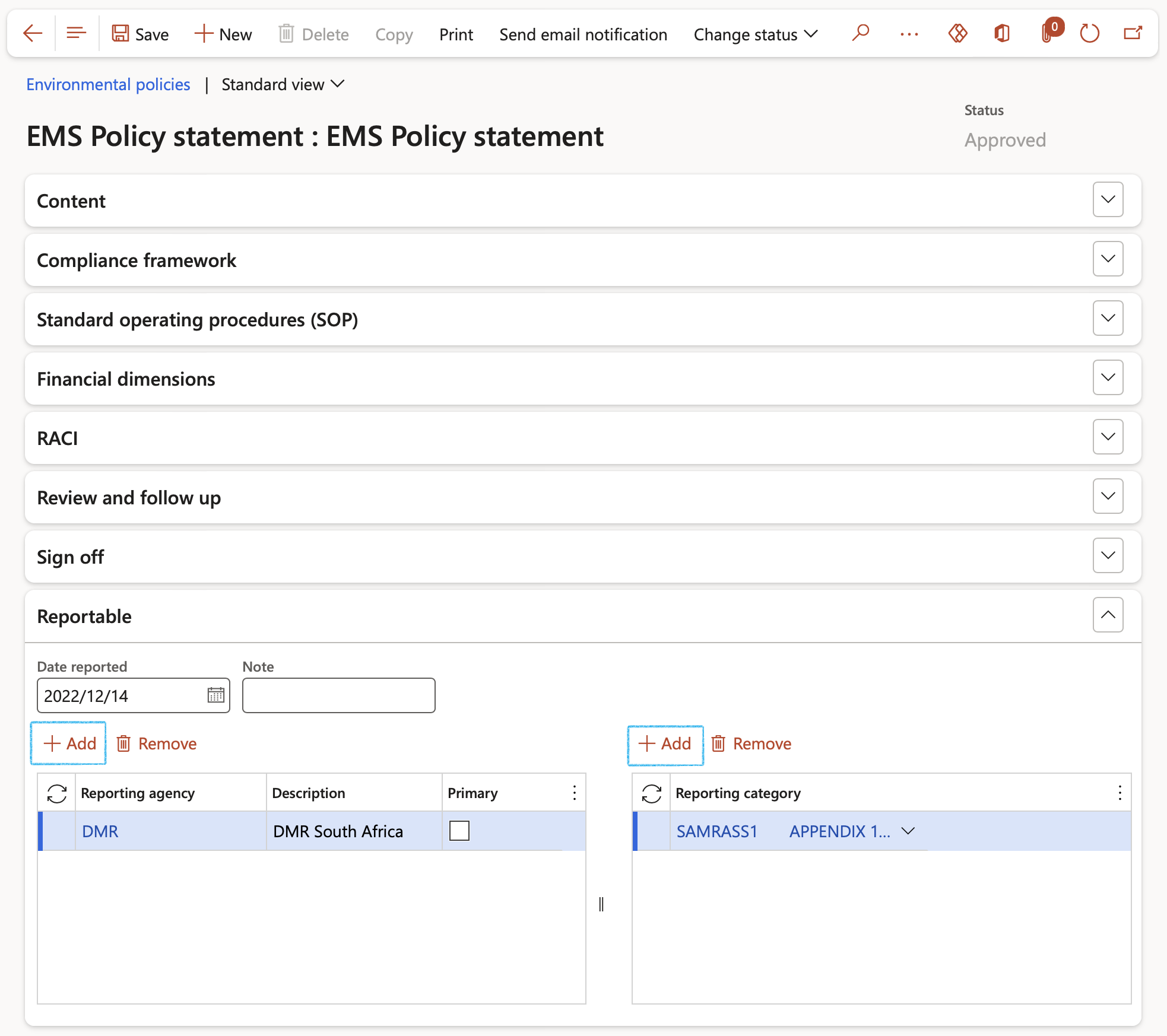
¶ Daily use
¶ Step 3: Policy statuses
| Status | Rules |
| Created: |
|
| Draft: |
|
| Received: |
|
| Submit: |
|
| Approve: |
|
| Revise: |
|
| Reject: |
|
| Archive: |
|
¶ Reporting
The Environmental policy can be printed
Go to: HSE > Environmental > Environmental policies
- Select the policy that you want to print
- In the Action pane, click on the Print button
- On the Print dialog the user has the option to print the cover page or not
- Click on OK
